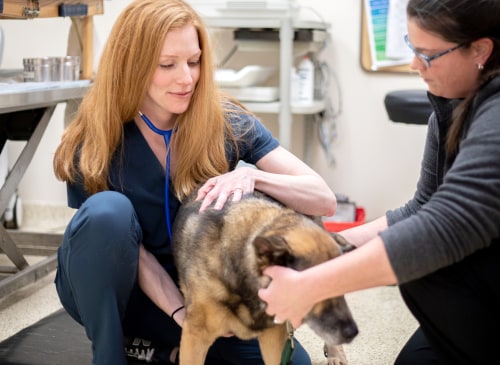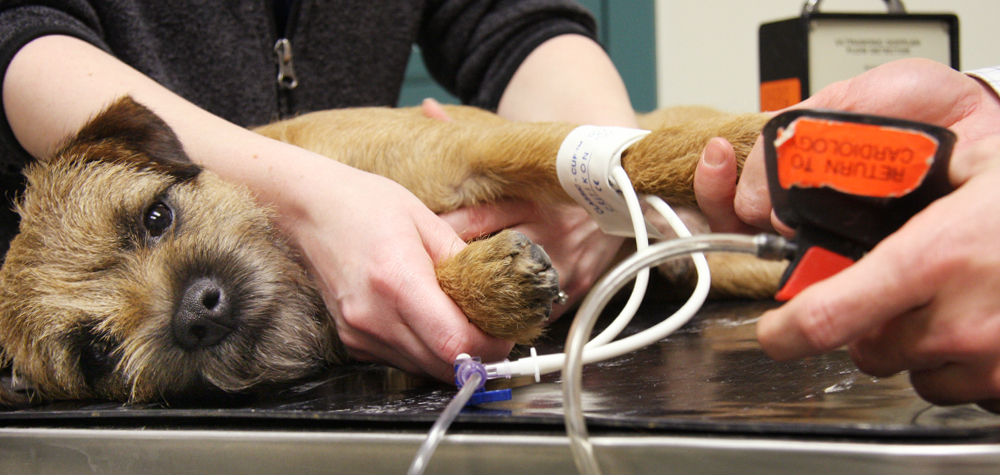Top Questions About Visiting a Cancer Veterinary Near Me}
Wiki Article
Discovering the Essential Providers Offered by a Veterinary Cardiologist: Understanding Ultrasound and CT Scan Strategies
Vet cardiologists play an essential function in the health and wellness of family pets by identifying and treating various heart disease. They use sophisticated imaging strategies, such as heart ultrasound and CT scans, to supply exact examinations. Each technique has its unique advantages and applications. Understanding these methods is vital for animal owners looking for the very best care for their friends. What variables should family pet owners take into consideration when selecting between these analysis devices?
The Duty of Veterinary Cardiologists in Animal Health Care
Vet cardiologists play an important role in the medical care of pets, focusing particularly on identifying and dealing with heart-related problems. They have specialized training that allows them to interpret complex diagnostic tests and identify various cardiovascular issues. These experts use sophisticated methods, such as echocardiography and electrocardiography, to examine heart feature and structure accurately.Veterinary cardiologists also develop tailored therapy plans that might consist of drugs, lifestyle modifications, and, in many cases, surgical interventions. Their experience encompasses enlightening pet dog owners regarding heart health, highlighting the significance of normal exams and very early discovery of prospective problems. Cooperation with general veterinarians is crucial, as it ensures complete look after animals with thought cardiac concerns. By using specialized services, veterinary cardiologists significantly improve the top quality of life for pet dogs and supply comfort for their owners, enhancing the significance of heart health in total animal wellness.Usual Cardiac Issues in Pet Dogs
Typical cardiac concerns in animals can substantially affect their health and wellness and quality of life. Heart whisperings, different kinds of cardiomyopathy, and hereditary heart issues are among one of the most common conditions that vets encounter. Ultrasound For Dogs. Recognizing these issues is necessary for family pet proprietors to ensure prompt medical diagnosis and ideal treatmentHeart Murmurs in Pets
Although heart murmurs can be a source of concern for animal proprietors, they are not constantly indicative of severe health issues. A heart murmur is an uncommon audio produced by unstable blood circulation within the heart. In pets, these murmurs can be brought on by different variables, including hereditary heart issues, shutoff issues, or even tension during exams. Many animals with heart murmurs lead regular lives without substantial health impacts. To figure out the underlying reason, vet cardiologists often employ diagnostic methods such as echocardiograms and Doppler ultrasounds. Early detection and evaluation are crucial, as they might aid take care of any potential cardiac issues effectively. Pet owners are encouraged to consult their veterinarian for an extensive examination if a heart whispering is found.Cardiomyopathy Kind Explained
Cardiomyopathy includes a team of illness impacting the heart muscle mass, resulting in compromised cardiac feature in family pets. The most typical types include expanded cardiomyopathy (DCM), hypertrophic cardiomyopathy (HCM), and limiting cardiomyopathy (RCM) DCM primarily affects pets, creating the heart to deteriorate and expand, which reduces its capability to pump blood effectively. On the other hand, HCM is more widespread in felines, characterized by the enlarging of the heart wall surfaces, typically resulting in blocked blood circulation. RCM, though less usual, takes place when the heart muscle mass becomes inflexible, limiting its ability to load with blood. Each type presents one-of-a-kind difficulties in diagnosis and therapy, requiring specialized veterinary cardiological examination to ensure peak monitoring and treatment for affected pet dogs.Hereditary Heart Defects
Hereditary heart issues represent a significant classification of cardiac problems in pets, unique from gotten conditions such as cardiomyopathy - Board Certified Veterinary Cardiologist. These issues are structural problems present at birth, influencing the heart's normal feature. Common kinds consist of patent ductus arteriosus, ventricular septal flaws, and pulmonic stenosis. Signs might vary extensively, ranging from moderate to extreme, and can include workout intolerance, coughing, and trouble breathing. Early diagnosis with innovative imaging methods like ultrasound is crucial for effective monitoring. Veterinary cardiologists play a crucial duty in identifying these problems and suggesting ideal treatment choices, which may consist of clinical management or surgical intervention. Recognizing congenital heart problems enables much better outcomes and enhanced lifestyle for impacted pet dogsRecognizing Cardiac Ultrasound: How It Functions
A considerable number of vet practices currently use cardiac ultrasound as an important analysis device for evaluating heart health in animals. This non-invasive method utilizes high-frequency acoustic waves to create photos of the heart's structure and feature. Throughout the treatment, a vet professional uses a gel to the pet's breast and utilizes a transducer to emit ultrasound waves. These waves bounce off the heart and surrounding structures, creating real-time pictures on a monitor.Veterinarians can examine different elements of cardiac health, including chamber size, wall surface activity, and shutoff function. Additionally, heart ultrasound permits for the discovery of irregularities such as liquid buildup and hereditary heart problems. This technique is vital for diagnosing conditions that might not be noticeable with basic radiographs. By offering detailed details regarding the heart's anatomy and efficiency, heart ultrasound aids in formulating effective therapy prepare for animals dealing with heart problem.The Value of CT Scans in Detecting Heart Conditions
How do CT scans improve the diagnosis of heart disease in veterinary medicine? CT scans supply detailed cross-sectional photos of the heart and bordering frameworks, allowing vets to visualize complicated anatomical partnerships. This imaging method is particularly helpful in determining genetic heart defects, heart tumors, and irregularities in blood vessels. By utilizing innovative imaging algorithms, CT scans can analyze heart chamber dimensions and function, using an extensive sight that may be hard to accomplish with typical methods.Additionally, CT angiography can visualize blood circulation and determine locations of stenosis or obstruction, which is crucial for intending potential treatments. The rate and precision of CT scans additionally promote fast diagnoses, important in emergency situation circumstances. Inevitably, the incorporation of CT checks into veterinary cardiology substantially boosts the accuracy of diagnoses, making it possible for targeted treatment plans and enhancing individual end results for animals experiencing from heart problems.Contrasting Ultrasound and CT Check Techniques
While both ultrasound and CT scans are very useful devices in veterinary cardiology, they provide unique benefits and constraints that affect their use in identifying heart disease. Ultrasound, or echocardiography, gives real-time imaging of the heart's framework and function, allowing veterinarians to examine heart chambers, shutoffs, and blood flow. It is particularly effective for reviewing problems like coronary infarction and cardiomyopathy. Ultrasound might be limited in imagining certain anatomical frameworks due to person dimension or obesity.In contrast, CT scans offer thorough cross-sectional photos of the heart and bordering cells, making them optimal for determining structural problems, lumps, or vascular problems. CT scans provide thorough understandings, they need sedation and may entail radiation exposure. Inevitably, the option between ultrasound and CT checks depends upon the particular clinical circumstance, the client's problem, and the info needed for an accurate medical diagnosis.Treatment Alternatives Offered Through Vet Cardiology
Veterinary cardiology offers an array of treatment alternatives tailored to attend to various heart disease in animals. Therapy plans often begin with way of life alterations, including diet regimen adjustments and exercise changes, focused on enhancing total heart health and wellness. Medicines play an important role, with cardiologists prescribing medicines such as diuretics, beta-blockers, and ACE preventions to boost and handle symptoms cardiac function.In extra serious cases, interventional treatments, such as balloon valvuloplasty or stent positioning, may be needed to alleviate obstructions or boost blood flow. For specific genetic heart defects, surgical choices might be explored to fix architectural concerns. Additionally, continuous surveillance and follow-up treatment are crucial components of a complete therapy strategy, allowing for timely changes based upon the pet's reaction to treatment. On the whole, veterinary cardiology concentrates on offering efficient, customized treatment to maximize the health and wellness and visit their website health of pet people with heart conditions.How to Prepare Your Animal for a Cardiac Assessment
Preparing an animal for a cardiac examination is vital to guarantee accurate results and a smooth process. Owners should first schedule the appointment with the veterinary cardiologist and talk about any particular requirements or worries. It is a good idea to keep food for a minimum of 12 hours prior to the evaluation, as this helps boost imaging top quality read this article throughout procedures like ultrasound or CT scans.Additionally, maintaining a calm setting on the day of the consultation can aid minimize the family pet's stress and anxiety. It is helpful to bring along any type of appropriate medical documents, consisting of previous tests and drugs (CT Scans For Dogs). Owners need to additionally make specific that their pet is comfy and leashed throughout transport to the facility. Lastly, familiarizing themselves with the evaluation procedure can help and reduce fears in asking notified questions throughout the assessment. By adhering to these steps, proprietors can add greatly to the effectiveness of the cardiac examinationFrequently Asked Inquiries
The length of time Does a Heart Ultrasound or CT Check Take?
The duration of a heart ultrasound typically ranges from 30 to 60 minutes, while a CT check might take around 15 to thirty minutes. Elements such as the person's condition can affect these time price quotes.
Exist Any Dangers Connected With These Analysis Treatments?

Can I Remain With My Pet During the Procedure?
The veterinary center's policy generally dictates whether pet dog proprietors can stay during procedures. While some facilities urge owner presence for comfort, others might require separation to guarantee safety and security and excellent problems for diagnostic imaging.Just how much Do These Analysis Tests Generally Cost?
The prices of diagnostic tests, such as ultrasound and CT scans, usually vary based upon area and facility. Typically, costs range from a few hundred to over a thousand bucks, showing the complexity and innovation involved.
What Is the Recuperation Refine After a Cardiac Evaluation?
The recuperation process after a heart analysis includes keeping track of the pet for any kind of instant reactions, ensuring convenience, and limiting exercise. Vets usually supply post-evaluation directions to assist pet proprietors throughout this vital recuperation period. Heart whisperings, various types of cardiomyopathy, and genetic heart problems are amongst the most prevalent conditions that vets encounter. A heart murmur is an uncommon sound created by stormy blood flow within the heart. Cardiomyopathy incorporates a group of conditions affecting the heart muscle mass, leading to endangered heart function in animals. Hereditary heart issues represent a considerable group of heart issues in animals, distinctive from obtained problems such as cardiomyopathy. Ultrasound, or echocardiography, supplies real-time imaging of the heart's structure and feature, enabling vets to check out this site examine heart chambers, valves, and blood circulation.Report this wiki page